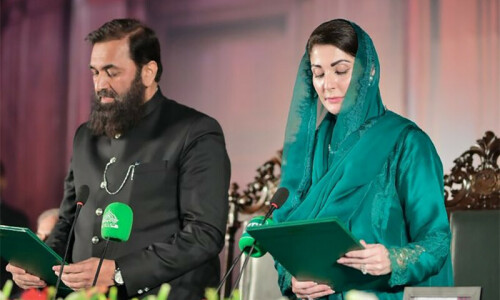TOBA TEK SINGH: The 9th two-day Punjabi Sulaikh Mela concluded on Monday in Faisalabad.
It was arranged by the Lyallpur Literary Council at Nusrat Fateh Ali Khan Auditorium, under the banner of Kuknas Organisation.
The festival witnessed the participation of prominent literary figures, researchers, and other important personalities working on the Punjabi language, literature, and history not only from across the country but also from international speakers.
The inaugural ceremony began with the singing of Taimur Afghani’s Heer. In his presidential address, Musadaq Zulqarnain said that the Laylpur Punjabi Literary Festival has become an important means of promoting Punjabi language and literature in Pakistan and around the world. He said that the importance of one’s mother tongue cannot be denied for any nation or person.
Due to this literature festival, the number of people speaking Punjabi and taking pride in it has increased, and the young generation is also becoming aware of its importance.
Punjabi writer Nain Sukh and Director of Arts Council Muhammad Abrar Alam spoke. The launch of Iqbal Qaiser’s book “Film and Lahore” and Amardeep Singh’s book “Lost Heritage: The Legacy of Sikhs in Pakistan” was also held. A stage drama titled “Anni Mai Da Safina” was presented by Ajoka Theatre.
In a session titled ‘Digitalisation of the Punjabi Language,’ Dr Asim Mahmood, Sukirat Anand from Jalandhar, Farrukh Arsalan, and Dr Raja Naseem Akhtar were panelists. They said many Punjabis had contributed to the promotion of their mother tongue through social media platforms, and currently, a lot of work is being done in the Punjabi language on digital media.
In a session titled ‘Translation: A Few Challenges,’ Prof Zabair Ahmad, Dr Amir Zahir Bhatti, Dr Abdul Aziz Malik, and Dr Ghulam Murtaza said that literature and poetry of other languages have been translated very little into Punjabi. A session was held on a documentary by historian Amardeep Singh from Singapore on the founder of the Sikh religion, Baba Guru Nanak, titled ‘Aar Nanak, Paar Nanak.’ In this highly engaging session, the artist who sang Baba Guru Nanak’s poetry in the documentary, Salima Khwaja, and producer Amardeep Singh expressed their views on the preparation of the documentary and the events related to it.”
A session was titled ‘Punjab’s Rivers,’ in which Dr Irfan Chaudhry, Dr Parvez Vandal, Dr Zafar Harral, and Nain Sukh spoke. They said that the rivers of Punjab are not only the identity of this region but also the foundation of its culture and the lives of its inhabitants.
Another session, titled ‘Punjabi Film Today and Tomorrow,’ featured Iqbal Qaiser, Shehzad Joya, Dr Sumaira Akbar, Dr Sajid Javed Chaudhry, and Shozab Askari. They said that film is an essential medium for the promotion of any language, stressing the need for further work on the Punjabi film industry in this important aspect.
The final session focused on the subject of ‘Punjab Study Center: Need of the Time.’ In this session, Dr Yaqoob Bangash, Dr Imdad Hussain, and Dr Abdul Qadir Mushtaq spoke. They said that the establishment of a Punjab Study Centre is essential for promoting and developing the Punjabi language, preserving Punjabi language, literature, and history for future generations.
The two-day festival concluded with the globally acknowledged play titled ‘Bulha’ by Ajoka Theatre, which was very well-received by the audience. The artists were given a standing ovation. Observers shared their views on how this festival is changing the common perspective that Punjabi is all about Bhangra and Dhol.
In the realm of Literary Festivals, the Lyallpur Punjabi Literary Festival stands out as the biggest literary festival of the mother language in South Asia.
The two-day festival witnessed a large number of citizens participating and getting the opportunity to listen to thought-provoking discussions on the Punjabi language, literature, and history by prominent writers, researchers, and other important personalities from Pakistan and abroad.
Published in Dawn, February 27th, 2024















































Dear visitor, the comments section is undergoing an overhaul and will return soon.